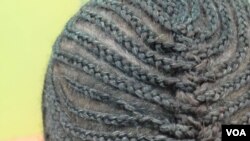JOHANNESBURG —
In a continent of dramatically contrasting poverty and wealth, hair is a rare common denominator that cuts across class and culture groups in Africa. The black hair business is worth billions worldwide, and the Africa market is slowly picking up as consumers look for the best products.
Good Hair, the 2009 documentary by comedian Chris Rock, spotlighted the business of black hair, particularly the use of relaxers, weaves and hair extensions. Elements of his documentary ring true in South Africa, the dominant market on the continent for hair care products. According to researchers, black women are willing to spend at least double the amount on hair and beauty products that white women do.
According to estimates from Euromonitor International, the Middle East and Africa hair care market alone was valued at $4.2 billion in 2013.
Zeenat Ebrahim, a senior analyst at Euromonitor, sees huge potential for the hair care market in Africa.
“Multi-national players, for example, in various locations in Africa are increasing their marketing in advertising budgets," Ebrahim explained, "this is really influencing consumer choice… the likes of hair conditioning products, these products are once again, increasingly appealing, especially because new product development with extra value is allowing consumers to have affordable and salon-like treatment at home."
Ebrahim said South Africa has the most established and developed market for these premium hair care products, which she says are gaining increased interest from consumers.
For many, hair is one of the defining characteristics that African women use to transform their appearance. In Rita Dantaa’s hair salon in downtown Johannesburg, rows of wigs and hair extensions mask the walls. Shelves under the mirrors are filled with gels, creams, mousses and hairspray. Her customers are not wealthy but they are still prepared to pay a few dollars for the salon experience to get their hair done.
Dipping her hand into a large white tub, Dantaa then smothers potent relaxer onto her customer’s hair.
“So after relaxing the hair, one week time or two weeks time, she need to come and do treatment to protect the hair from breaking, and then when she finish, she can decide to put a weave or braid or leave her hair like this - it’s up to her,” Dantaa explained.
Sodium hydroxide is the key ingredient used in relaxers, and can smooth out even the toughest afro curls. But it burns the scalp if left on too long. Dantaa quickly moves to rinse the white cream off her customer’s hair after she complains that her head is burning.
“It’s a bit hot, let’s say….like when you put a weave, once you are scratching, you are bringing sores on your scalp, so if you scratch too much and you relax you get burnt. It’s not bad, it grows the hair and it makes the hair look nice,” she said.
Another popular practice is the application of hair extensions or weaves in which strands of hair are woven in. At Rita's salon, synthetic hair extensions cost $10. In Johannesburg’s upmarket business district, prices range up to $800 for hair extensions.
Donald Zaburoni has been a hair stylist for nearly 10 years. He said the improving quality of human hair extensions has driven demand, although for some women, the time and the potential pain is not worth it.
“You have people in SA that prefer to be all African natural, they don't go for weaves, they don't go any other thing" he explained. " Most of my clients used to have weaves, used to relax their hair - then they realized that this is not for me…So with your natural hair you do your corn rows, you do anything with it, you want to rock up in your afro - you rock up in your afro."
Good Hair, the 2009 documentary by comedian Chris Rock, spotlighted the business of black hair, particularly the use of relaxers, weaves and hair extensions. Elements of his documentary ring true in South Africa, the dominant market on the continent for hair care products. According to researchers, black women are willing to spend at least double the amount on hair and beauty products that white women do.
According to estimates from Euromonitor International, the Middle East and Africa hair care market alone was valued at $4.2 billion in 2013.
Zeenat Ebrahim, a senior analyst at Euromonitor, sees huge potential for the hair care market in Africa.
“Multi-national players, for example, in various locations in Africa are increasing their marketing in advertising budgets," Ebrahim explained, "this is really influencing consumer choice… the likes of hair conditioning products, these products are once again, increasingly appealing, especially because new product development with extra value is allowing consumers to have affordable and salon-like treatment at home."
Ebrahim said South Africa has the most established and developed market for these premium hair care products, which she says are gaining increased interest from consumers.
For many, hair is one of the defining characteristics that African women use to transform their appearance. In Rita Dantaa’s hair salon in downtown Johannesburg, rows of wigs and hair extensions mask the walls. Shelves under the mirrors are filled with gels, creams, mousses and hairspray. Her customers are not wealthy but they are still prepared to pay a few dollars for the salon experience to get their hair done.
Dipping her hand into a large white tub, Dantaa then smothers potent relaxer onto her customer’s hair.
“So after relaxing the hair, one week time or two weeks time, she need to come and do treatment to protect the hair from breaking, and then when she finish, she can decide to put a weave or braid or leave her hair like this - it’s up to her,” Dantaa explained.
Sodium hydroxide is the key ingredient used in relaxers, and can smooth out even the toughest afro curls. But it burns the scalp if left on too long. Dantaa quickly moves to rinse the white cream off her customer’s hair after she complains that her head is burning.
“It’s a bit hot, let’s say….like when you put a weave, once you are scratching, you are bringing sores on your scalp, so if you scratch too much and you relax you get burnt. It’s not bad, it grows the hair and it makes the hair look nice,” she said.
Another popular practice is the application of hair extensions or weaves in which strands of hair are woven in. At Rita's salon, synthetic hair extensions cost $10. In Johannesburg’s upmarket business district, prices range up to $800 for hair extensions.
Donald Zaburoni has been a hair stylist for nearly 10 years. He said the improving quality of human hair extensions has driven demand, although for some women, the time and the potential pain is not worth it.
“You have people in SA that prefer to be all African natural, they don't go for weaves, they don't go any other thing" he explained. " Most of my clients used to have weaves, used to relax their hair - then they realized that this is not for me…So with your natural hair you do your corn rows, you do anything with it, you want to rock up in your afro - you rock up in your afro."







